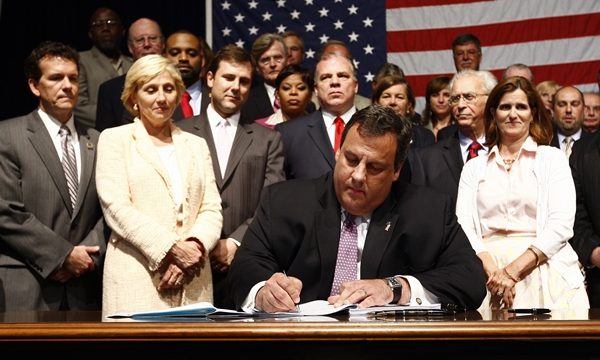New Jersey pension funds sue Christie for non-payment

PROMISES – Gov. Chris Christie is being sued over a 2011 pension reform that backfired
By Mark Lagerkvist | New Jersey Watchdog
New Jersey’s three largest pension funds are suing Gov. Chris Christie and his administration for failing to make payments to the state retirement system as required by statute.
Filed Wednesday in Mercer County Superior Court, the lawsuit is the latest conflict in the wake of Christie’s decision last June to balance the state budget by chopping nearly $900 million from a scheduled contribution of $1.6 billion. The governor also announced plans to cut $1.6 billion from the state’s obligation of $2.25 billion for the current fiscal year.
“The governor is not living up to his own pension reform,” said Wayne Hall, chair of the Police and Firemen’s Retirement System, told New Jersey Watchdog. “We had to step up and do this; we had to protect our members.”
The other plaintiffs are the Public Employees’ Retirement System and the Teachers’ Pension and Annuity Fund. Combined, the three pension plans represent roughly 290,000 retired public workers plus 475,000 active members.
Overall, the state’s retirement systems face a $170 billion shortfall according to the state’s official numbers. That includes:
- $82.7 billion in unfunded liability for the pension plans of state workers
- A $20.7 billion shortfall for the pensions of local government employees
- $53 billion in unfunded health benefits for state retirees
- $13.8 billion to cover the post-employment benefits local government workers
Last week, a report from Moody’s Investor Service projected PERS would go broke by 2024 followed by PFRS and TPAF in 2027 unless the state changed course.
The pension funds are asking the court to force the state to make its payments in full. Or as an alternative, they want a judge to void the 2011 pension reform law that required public employees to increase their contributions and accept a freeze in cost-of-living increases.
When enacted, Christie declared its passage was his “biggest governmental victory.” Now, as he eyes a run for the White House in 2016, an unresolved pension crisis could be his political Waterloo.
Christie’s press office did not respond to New Jersey Watchdog’s request for comment.
“We’ve heard the governor say, ‘If you don’t like it, sue me’ – so that’s what we’re doing,” said Hall.
Typically the pension funds are represented in court by the state attorney general, a gubernatorial appointee who also represents the governor on legal matters.
In this case, the attorney general’s office has recused itself to avoid the conflict of interest, according to Hall. The pension funds are seeking a court order to require the state to pay for the external attorneys they hired.







